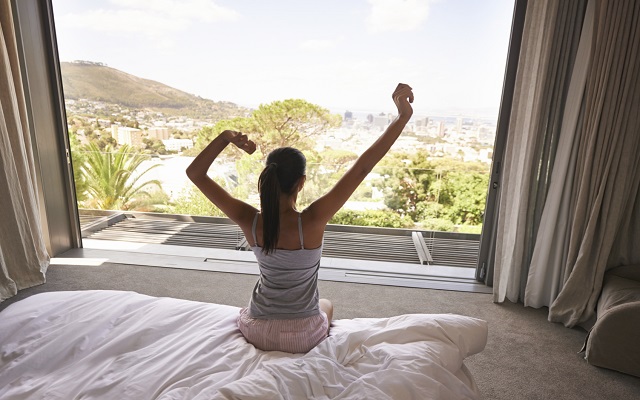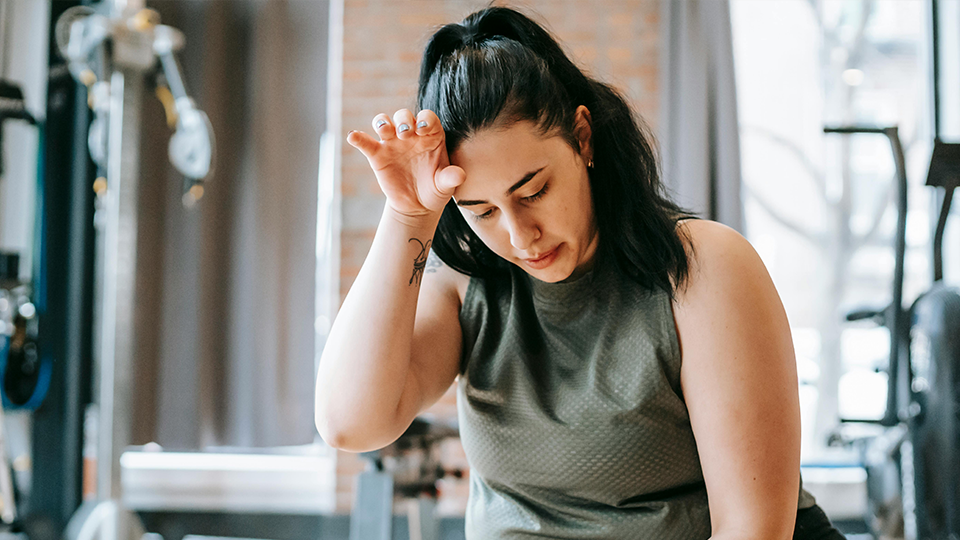There’s nothing better than waking up feeling refreshed and full of energy. But for most people, this takes some effort and planning. An energized morning depends on a disciplined bedtime routine and healthy dietary habits.
Choosing these good habits can do much more than just improve your mornings; it can also lead to better overall health for your body. Here’s a step-by-step morning refresher course for you:
1. Exercise for Better Rest
Exercise and sleep have a special relationship that creates harmony throughout the body—harmony that translates to how well you feel in the morning. Exercise aids in getting a better night’s rest and to better subsequent exercise performance. Exercise is also linked to lowering many common sleep problems (1-3). If you are someone who is less interested in exercise, try a cup of Isagenix Coffee or an e+™ shot before your workout. Coffee and caffeine can help you power through your workout with an extra boost of energy.
2. Make Early Bedtime a Priority
Research shows that getting to bed at a decent time and sleeping for seven to eight hours nightly can increase overall health and the ability to wake refreshed. Skimping on sleep for as little as an hour a night is associated with a long list of health-related problems. This “mild sleep restriction,” or lost hours of rest, can decrease your energy, the quality of your mornings, and decrease your daily fat burning by up to 50 percent (2, 3, 5).
3. Change Your Late-Night Snack to Whey Protein
Whey protein provides the complete amino acid profile that the body needs to recover while sleeping so that you can wake refreshed. Additionally, whey protein is reported to be one of the best sources of nutrition for helping regulate glucose metabolism, weight loss, muscle growth, and the retention of lean body mass (6). For ultimate effects from whey protein, try the Bedtime Belly Buster with IsaPro®.
4. Turn Down Your Bedroom Temperature
Researchers have found that a cooler environment makes for improved rest and better mornings. The consensus is that people get their best rest when their sleep environment is around 60 degrees Fahrenheit. When the bedroom is too warm or too cool, sleep quality may not be optimal. Poor sleep is associated with alterations in insulin sensitivity and hormonal regulation (7).
5. Nix the Electronics Before Bed
Light-emitting electronic devices used before sleep make it harder to fall asleep (8). This delayed sleep onset causes glitches in the body’s natural rhythm, suppressing production of melatonin in the body. A lack of melatonin leads to reduced amounts of deep sleep needed for morning alertness. When technology is used in the evening it can increase alertness, making it more tempting to stay up late. Turning off the late-night technology will help you to rest deeply, so that your body can release appropriate levels of growth hormone and cortisol, while waking refreshed and ready to go. Isagenix provides a superior melatonin product, Sleep Support & Renewal, which can also help restore melatonin levels to help you fall asleep faster, stay asleep longer, and wake up feeling more refreshed.
6. When you Wake, Drink Isagenix Coffee
Even if you had a less than optimal night’s sleep, there is hope for a more alert morning. You can outsmart the morning blues with Isagenix Coffee. Coffee is steeped with energy-boosting caffeine, along with other components like chlorogenic acid, ferulic acid, and caffeic acid that are a bonus “perk.” It’s also an excellent, zero-calorie beverage that studies show is associated with a lower body weight (9). Give these science-approved tips a try and watch as you become more of a morning person.
References
- Chennaoui M et al. Sleep and exercise: A reciprocal issue? Sleep medicine reviews 2015; 20: 59-72.
- Hursel R et al. Effects of sleep fragmentation in healthy men on energy expenditure, substrate oxidation, physical activity, and exhaustion measured over 48 h in a respiratory chamber. Am J Clin Nutr 2011; 94: 804-8.
- Copinschi G et al. Alterations of circadian rhythmicity and sleep in aging: endocrine consequences. Hormone Research 1997; 49:147-52.
- Lucas M et al. Coffee, caffeine, and risk of depression among women. Arch Intern Med 2011; 26: 1571-1578.
- Van Helder T et al. Sleep deprivation and the effect on exercise performance. Sports Med 1989; 7: 235-47.
- Pegoretti C et al. Milk an alternative beverage for hydration. Food Nutr Sci 2015; 6: 547-554.
- Wang Y et al. Appropriate indoor operative temperature and bedding micro climate temperature that satisfies the requirements of sleep thermal comfort. Building and Environment 2015; 92: 20-29.
- Changa A et al. Evening use of light-emitting eReaders negatively affects sleep, circadian timing, and next-morning alertness. PNAS 2014; 112 (4): 1232–1237.
- Hall S et al. A review of the bioactivity of coffee, caffeine and key coffee constituents on inflammatory responses linked to depression. Food Research International 2015.





